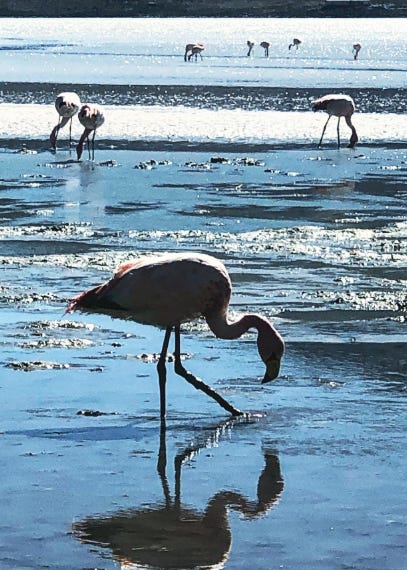Hola, my name is Carmen
BOLIVIA: Five bolivianos buys dignity and respite in this wild waypoint somewhere on the edge of everywhere.
Hola. My name is Carmen. I am 36 years old and live most of the time in Uyuni, Bolivia. When I am not in Uyuni, I am working here near Cerro Tomasamil. It is far away from everywhere, and a rest place to stop for people like you visiting Salar de Uyuni.
The concrete building stands resolute against the vast emptiness, its roughly textured walls catching the harsh light of midday. Carmen sits in the thin sliver of shade it casts, her wide-brimmed hat creating a second sanctuary of shadow across her face. Behind her, the landscape stretches toward distant mountains. The palette of ochre and sienna interrupted only by the occasional scrub that has mastered the art of thirsting slowly.
It is a small place, with just a shop and bathrooms. Visitors park Jeeps and walk among the strange volcanic landscape that was created by the eruption of Mount Tomasamil. There is also a lake not far away which has many birds, like pink flamingos.
The flamingos exist as smudges of impossible pink against the alkaline waters—colour that seems borrowed from another world entirely. When the wind shifts, you can almost hear their distant calls carried across the altiplano, a sound as ancient as the volcanic formations that punctuate this otherworldly terrain.
Before or after their walk, people must go to the toilet because there are not many places to go to the toilet in the desert. I charge 5 Bolivianos to use the toilet. This includes a few sheets of paper too. It is a very big toilet and I am proud of it. It is cleaned after every group uses it. I also play music from the radio for people to listen.
The transistor radio crackles with cumbia rhythms that seem incongruously vibrant in this place where silence is the natural state: a profound quiet that blankets everything beyond the concrete walls marked "Bs. 5."
When there are no people coming, I sit in the sun and knit. I do this for a few hours, then swap with my sister and work in the shop while she collects toilet money. It's just the two of us. We change places like this from very early in the morning to the afternoon when the sun goes away.
Her needles click with hypnotic regularity, hands moving in the same rhythms that generations of Bolivian women have employed to turn necessity into beauty. The wool is dyed in colours that echo the landscape. Time moves differently here; measured not in minutes but in rows completed, vehicles arriving, shadows lengthening across the parched earth.
And sometimes park rangers call in. They like to play foosball. We do this for two weeks, living in a small room next to the shop. Sometimes at night I hear the train many miles away. After that we move back to Uyuni. Then after a while, we come back for another two weeks.
At night, the Milky Way emerges with impossible clarity in the thin air, creating a ceiling of light above their small outpost. The distant rumble of a train doesn't break the silence but somehow becomes part of it, connecting their isolation to the wider world beyond the salt and stone.
In the shop we sell tea and coffee and beer and biscuits and souvenirs and llama sausages. They cost 15 bolivianos. But we ran out of sausages yesterday. I am not sure when the next sausages will come.
The absent sausages hang in the conversation like a small reminder of the tenuous supply lines that connect this outpost to elsewhere. Everything here arrives when it arrives. It’s a philosophy embedded in Carmen's steady gaze and unhurried movements. The shop inventory, like the woman herself, has adapted to the rhythms of a place where urgency has no purchase.
I hope you like my country. Have a good day.
Her words linger as visitors climb back into their vehicles, continuing journeys that Carmen has witnessed but never taken. She returns to her plastic chair, adjusting her position to follow the narrow band of shade.
The knitting resumes. In an hour, or perhaps two, her sister will emerge and they will exchange places in their well-practiced choreography of survival in this beautiful, unforgiving corner of Bolivia where Carmen guards both facilities and traditions with equal care.
*As translated with obvious help from David the extraordinarily patient tour guide.









